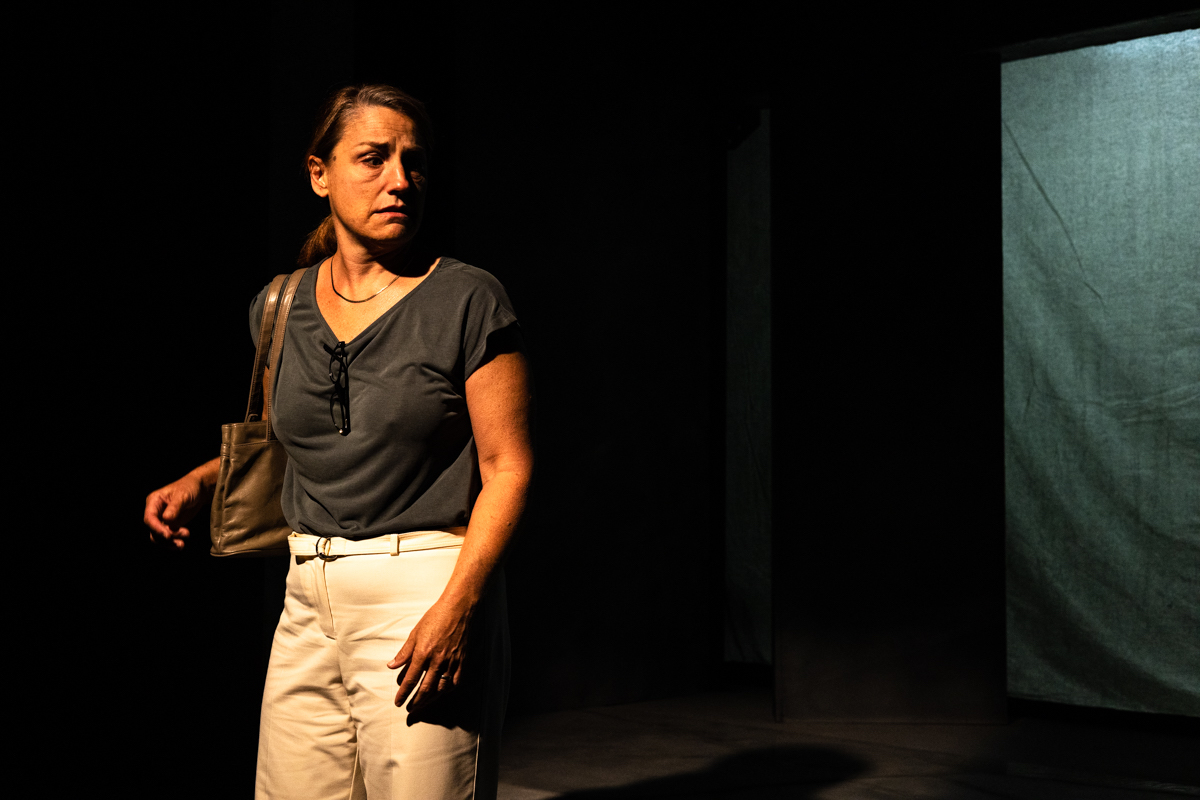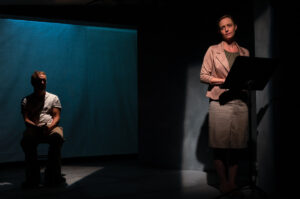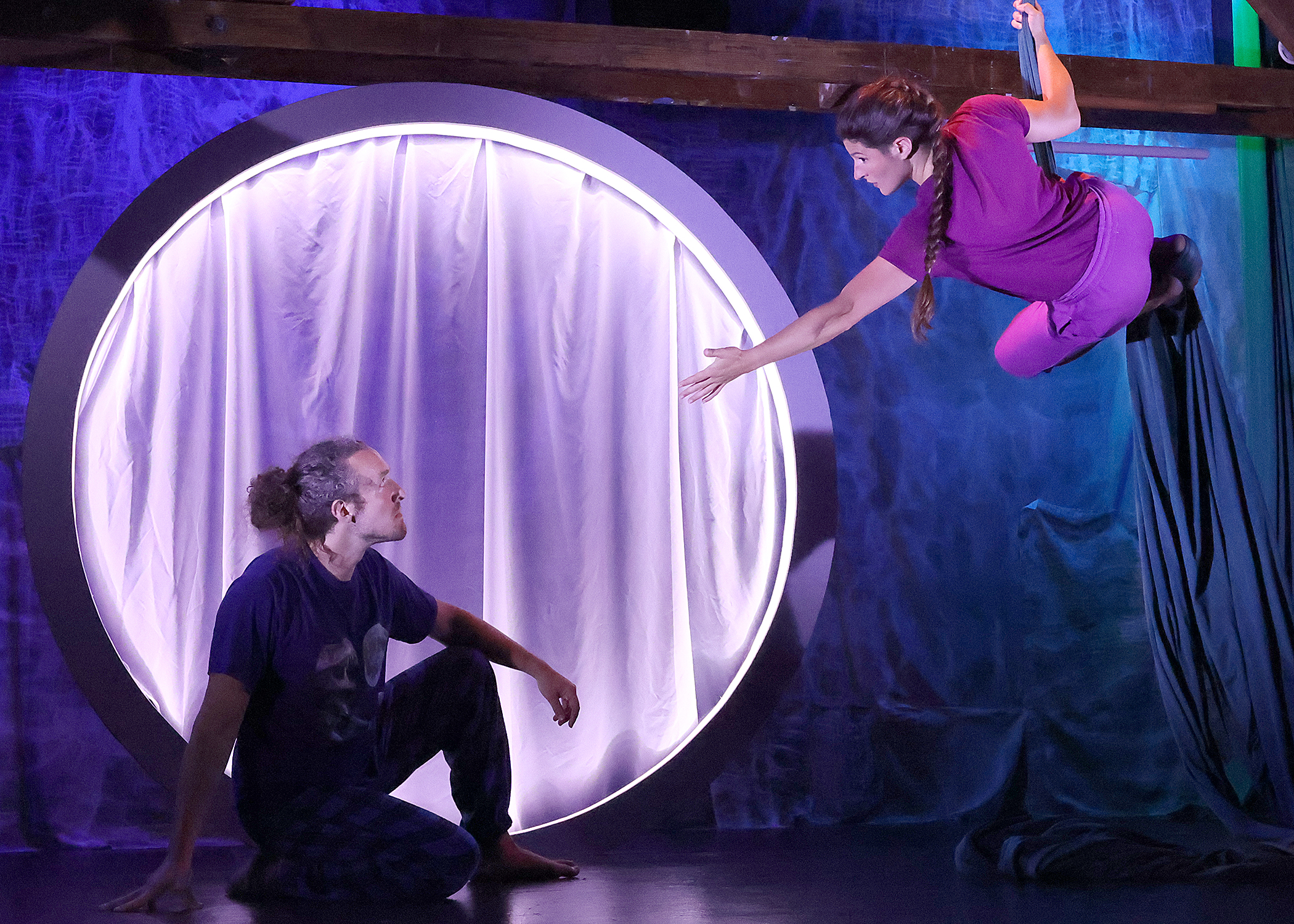
When You Can’t Look Away: Frozen at the Harbor Stage

One has to start with a trigger warning: Bryony Lavery’s play Frozen could be quite difficult for some people to watch, dealing as it does—intimately—with pedophilia and serial murder. None of that is immediately obvious to the audience; as the play opens, we’re listening to middle-aged Nancy (D’Arcy Dersham, in an achingly poignant performance), gardening in her London suburb and chatting about her family.
When Ralph—played by Harbor Stage founding member and artistic director Robert Kropf—separately launches into an energetic complaint about his landlady’s disregard for his food preferences, there’s some laughter in the room. He’s Cockney-adjacent, flippant, and achingly ordinary…. Until he’s not. As it dawns on the audience that what he is describing in practical workmanlike terms is actually his mode of luring little girls into his van, the room falls silent.
Not what anyone expected, that.
There’s not much of the expected in this play, which of course heightens its impact. The first third is made up exclusively of monologues, and when eventually two characters are on stage together, there is still the sense of an invisible cage around each one, as though they’re unwilling to be touched… or changed.
We meet Agnetha (Harbor Stage founding member Stacy Fischer), the third person physically present—a whole lot of ghosts, living and dead, hover in the air around the three characters—when she’s leaving her New York apartment on her way to London. It’s immediately obvious that this is one psychologist who might be just a little high on her own supply; she can’t negotiate too many steps on her journey without a whole lot of calming self-talk. Grieving the loss of her professional partner, she is nonetheless determined to bring a clinical perspective to her examination of the minds of those who do terrible things, and Ralph’s arrest and imprisonment afford her the opportunity to examine one such mind in depth.
Agnetha may be concerned with the criminal mind in general, but for Nancy the question is anything but academic: her daughter disappeared twenty years ago, and Rhona’s are among the remains found in Ralph’s shed after his arrest. Nancy expresses her grief through the quotidian, desperately trying for an aura of normalcy as she explores the reactions of her husband and remaining daughter with the passing of time. Like many dead children, Rhona has assumed a status of perfection in her mother’s mind, whereas Ingrid, who now “has a new way of talking like a diet and exercise book,” has dreamed of Rhona trapped under ice and decided she must move on from grief. “She was my little girl!” Nancy says, before glossing over Ingrid’s response, the response of all siblings of lost children: “So was I, Mum.”

Her marriage over, Nancy’s plan is to move on—but not before confronting Ralph, connecting in some way with her daughter through the man who killed her. Agnetha, between lecturing on the difference between evil and mental illness and herself having sessions with Ralph, opposes the idea. All three characters are now becoming more and more splintered, unsure how to move from the frozen wastelands of their lives into something new and potentially frightening, and are all moving rapidly toward a crescendo that’s as frightening as it is unpredictable.
Enough cannot be said about the acting; Fischer, Kropf, and Dersham are, together and individually, absolutely stellar. Even though their characters’ lives are hard to look at, once you start looking, you can’t look away; and while this is due partly to the writing—Lavery is clearly gifted—it is the actors’ embodiment of these characters that makes the story feel visceral, immediate, true.
Even in this extraordinary company, Kropf’s work has to be singled out. As he describes how he lures children (“hello… it’s bad manners not to answer when someone says hello… hello…”) he is gazing out into the audience, seemingly singling out people there, and the words are chilling. (This particularly so to women who both as adolescents and adults have experienced that same manipulative strategy—probably most of the women present.) And the most wrenching moment of the play is when Ralph and Nancy meet. She has a photograph to show him “of Rhona’s sister,” and his interest is sparked. “How old is she?” The visible sagging of his shoulders and his turning away when informed she is now 33 is both mesmeric and very, very scary.
Ultimately Frozen doesn’t prove its own central thesis, that there is a difference in serial offenders between the morally depraved and the mentally ill. But it poses the question in intense, sometimes shocking, ways that force us to look at pain, what it does, and what it means.
I would be remiss if I didn’t call out Evan Farley’s set design, with its almost-living scrim at the back of the stage that illustrates, underlines, and expands on our understanding of the characters—totally in keeping with a theatre company that routinely elevates simplicity to elegance. The costumes are equally simple yet fantastically versatile. And Harbor Stage founding member Jonathan Fielding is unquestionably at the top of his game as a director here.
Frozen—a disturbing, riveting, and exceptional play—is a perfect choice for the Harbor Stage Company, with its fierce determination to always ask more questions of its audience than it answers.
With the trigger warning in mind, highly recommended.
Images: Edward Boches
More Recent Provincetown News




 Accommodations
Accommodations  Art
Art  Bars
Bars  Books
Books  Entertainment
Entertainment  Events
Events  Featured
Featured  Guides
Guides  History
History  Literary stuff
Literary stuff  Most Popular
Most Popular  Provincetown News
Provincetown News  Restaurants
Restaurants  Reviews
Reviews  Shopping
Shopping  Theatre
Theatre  Uncategorized
Uncategorized  Weed
Weed